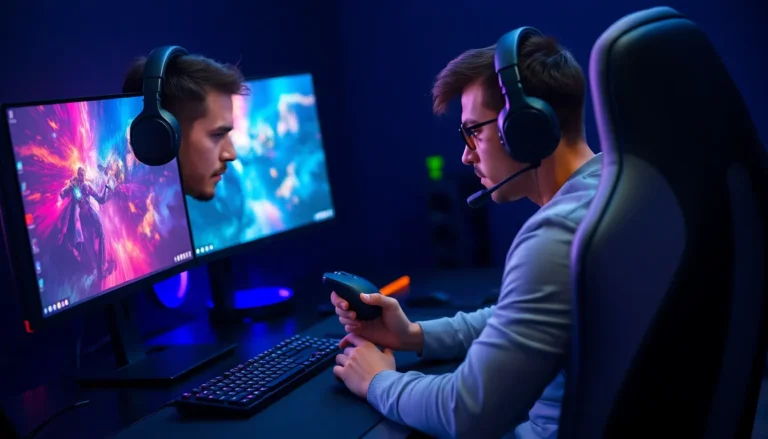In a world where competitive gaming has exploded into a multi-billion dollar industry, the debate rages on: are esports really sports? While some folks might argue that sitting on a couch with a controller doesn’t quite match the sweat and tears of traditional sports, others see a new arena of athleticism emerging. After all, who needs a soccer ball when you’ve got a keyboard and the reflexes of a cat on caffeine?
Table of Contents
ToggleDefinition of Esports
Esports refers to organized, competitive video gaming. This sector involves both professional players and teams competing in various game titles for prizes and recognition.
What Constitutes Esports?
Esports encompasses structured competitions between players or teams, typically involving video games. Formats may include one-on-one matches, team battles, or tournament brackets. Games like League of Legends, Dota 2, and Counter-Strike: Global Offensive serve as prime examples, demonstrating competitive gameplay and strategic depth. Audiences can engage through live broadcasts or in-person events. Various rules and regulations govern these competitions, ensuring fair play and promoting professionalism.
The Evolution of Esports
Esports has evolved significantly over the past few decades. It began as a niche activity in the 1970s and gained traction with early tournaments. The 1990s introduced the first official esports competitions, with titles like StarCraft spearheading the movement. By the 2000s, streaming platforms like Twitch emerged, amplifying visibility for gamers. Today, esports thrives globally, with millions of dollars in sponsorships and esports leagues. This growth illustrates a shift in culture, transforming gaming into a recognized form of competition akin to traditional sports.
The Debate: Are Esports Sports?
The classification of esports as sports has sparked significant discussion. Advocates highlight various aspects that align esports with traditional sports.
Arguments in Favor of Esports as Sports
Proponents argue that esports require significant skill and strategy. Professional players demonstrate quick reflexes, intense focus, and teamwork. Moreover, organized competitions mirror traditional sports structures, featuring leagues, tournaments, and rankings. Prize pools often exceed millions of dollars, rivaling those in athletic sports. Additionally, esports communities provide fan engagement comparable to conventional sports, emphasizing the social aspect of competition.
Arguments Against Esports as Sports
Critics contend that esports lack physical exertion inherent in traditional sports. They emphasize the absence of athleticism, with many believing that mere hand-eye coordination does not equate to physical prowess. Moreover, some argue that the environment of a gaming chair falls short of the physical demands present in fields or arenas. Lastly, a common viewpoint suggests that traditional sports foster physical health and teamwork in a manner that esports cannot replicate.
The Physical and Mental Aspects of Esports
Esports require a unique combination of physical and mental attributes, challenging conventional definitions of athleticism.
Physical Requirements in Esports
Players exhibit physical demands despite common perceptions. Quick reflexes and hand-eye coordination play vital roles, necessitating consistent training. Some gamers develop endurance to maintain performance over long sessions, often lasting several hours. Good posture and ergonomics during gameplay prevent injury and enhance longevity. Competitive environments frequently involve intense stress levels, which can also affect physical health.
Mental Skills Required for Success
Mental acuity stands at the core of esports performance. Strategy formulation requires quick, analytical thinking that can shift rapidly during matches. Players enhance their ability to adapt by experiencing diverse gameplay situations. Teamwork plays a critical role, as effective communication fosters collaboration among team members. High-level concentration is necessary, allowing players to scan their surroundings for information and react quickly. Overall, mental resilience proves essential, enabling individuals to cope with high-pressure scenarios and competitive contexts.
Cultural Perception of Esports
Cultural perceptions of esports continue to shift as they gain prominence in society. Many now view esports as a legitimate form of competition, akin to traditional sports.
Esports in Mainstream Media
Increased coverage of esports in mainstream media shapes public perception. Major networks, including ESPN, broadcast tournaments and news, showcasing professional gamers. Documentaries and feature articles also highlight player stories and community engagement. Such exposure promotes awareness and appreciation, attracting new audiences. Events like The International for Dota 2 feature multi-million dollar prize pools, capturing attention worldwide.
Impact on Traditional Sports
Esports influence traditional sports leagues and organizations. Partnerships between esports teams and conventional sports franchises are on the rise. For instance, many professional sports teams invest in or create esports divisions, offering mutual benefits. These collaborations expand fan bases and enhance engagement strategies. Additionally, traditional athletes support and participate in esports events, fostering crossover appeal and recognition. This melding of worlds reflects changing attitudes toward competition and athleticism.
The classification of esports as sports continues to spark debate. While traditionalists may cling to physicality as the defining trait of athleticism, the evolution of gaming challenges these notions. Esports demand a unique blend of skill strategy and teamwork that rivals conventional sports.
As esports gain mainstream recognition and cultural acceptance the lines between traditional and digital competition blur. With substantial investments and growing audiences esports are carving out their own space in the competitive landscape. Ultimately whether one views esports as sports or not it’s undeniable that they represent a significant shift in how competition is perceived and celebrated in today’s society.




